Barn Believers find ways to restore old barns so they can be used for public purposes - Second Wave Media
Sometimes the barns are leaning and have lost all their windows. Sometimes the roof is caving. But there are those who can look beyond the ravages of time and weather to see history worth preserving.
Jan Corey Arnett is one of them. Yet she says when she tells others of her passion for saving old barns raised eyebrows often followed.
"There was a period of time where I got that sideways look," says Arnett who lives in Bedford Township and has devoted much of her adult life writing about the importance of saving barns and finding kindred spirits who share her belief.
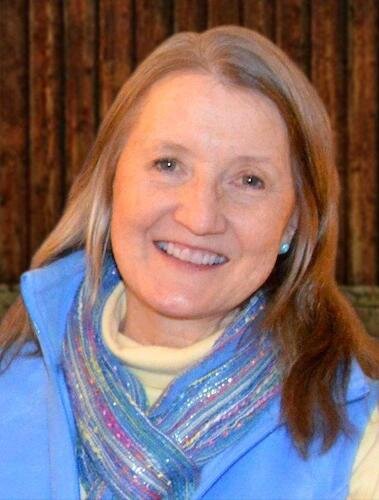 Their collective passion for preventing the destruction of what they consider an important part of America's history evolved into a group called Barn Believers that established a community project fund at the Battle Creek Community Foundation in 2017 to help offset the cost of restoring old barns if they are used for public purposes. Grants of up to $5,000 are available for these types of barn restoration projects throughout Michigan that meet the Barn Believers guidelines.
Their collective passion for preventing the destruction of what they consider an important part of America's history evolved into a group called Barn Believers that established a community project fund at the Battle Creek Community Foundation in 2017 to help offset the cost of restoring old barns if they are used for public purposes. Grants of up to $5,000 are available for these types of barn restoration projects throughout Michigan that meet the Barn Believers guidelines.
Arnett says three projects have already received grants through their Barn Believers fund. They include updates and improvements to signage at the Historic White Pine Village in Ludingtonto promote a greater understanding of the value and history of farmstead artifacts, repairs to a barn at a historic village-type setting in South Haven, and most recently the relocation of a historic granary to the Calhoun County Fairgrounds just outside of Marshall.
The granary project grant was awarded to the Calhoun County Agricultural and Industrial Society to make repairs which will make it operational again for use as a community education tool, says Ron Quinn, a member of the Granary Committee that's spearheading the project. He and his wife, Ann, both retired, live in Marshall Township in a home on the former Lockwood Farms property.
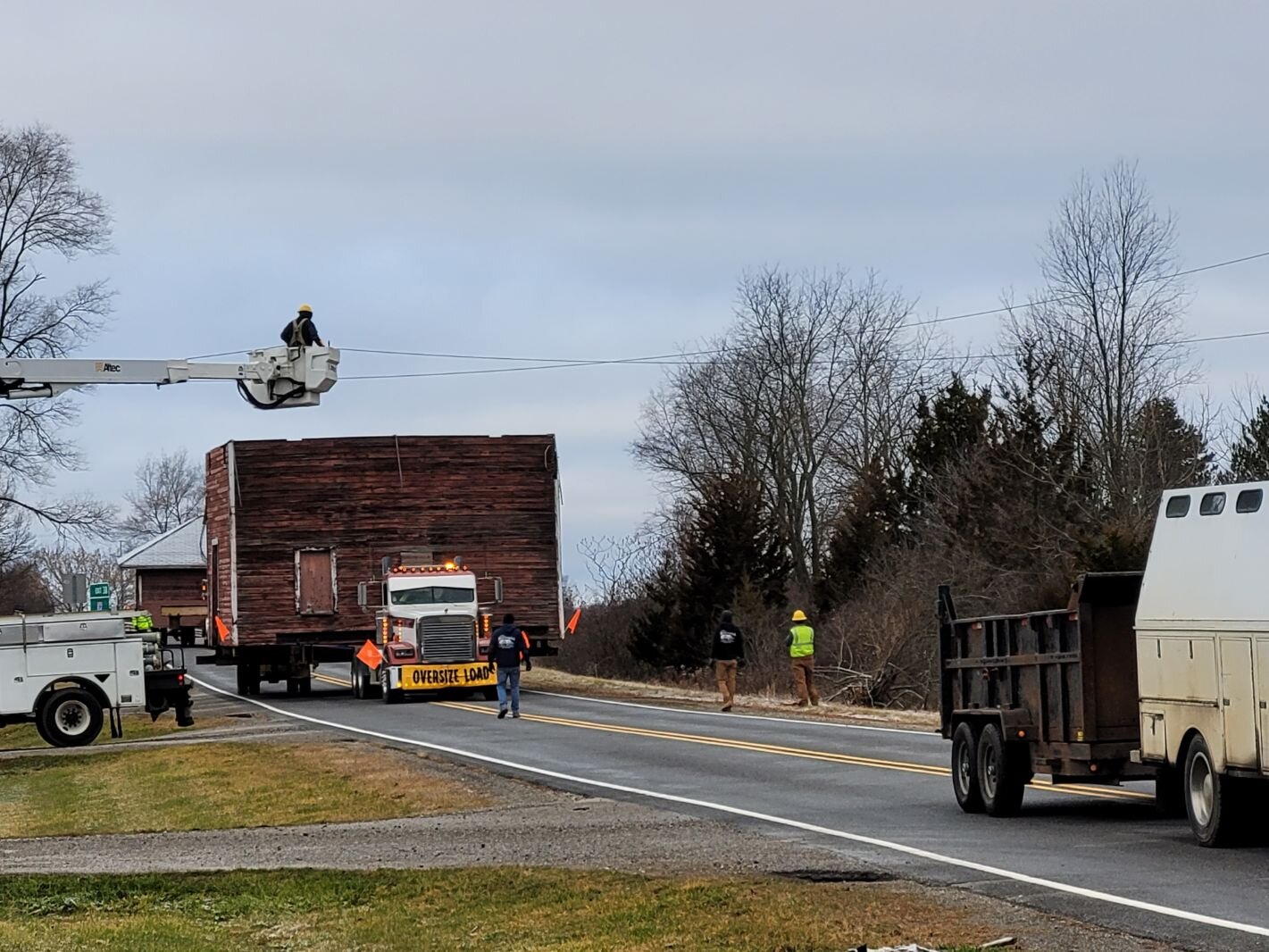 The Lockwood/Avery granary being moved from its original location to the Calhoun County Fairgrounds just outside of Marshall.Quinn says the grant contributed to the cost of moving the granary in 2020 and stabilizing it at the fairgrounds. The grant also will help to cover the cost of some educational programming where people will learn about the structure's importance in local agricultural history. The granary, known as the Lockwood/Avery Granary was donated by Tyler and Lisa Avery, current owners of the farm established in 1853 by Isaac Lockwood.
The Lockwood/Avery granary being moved from its original location to the Calhoun County Fairgrounds just outside of Marshall.Quinn says the grant contributed to the cost of moving the granary in 2020 and stabilizing it at the fairgrounds. The grant also will help to cover the cost of some educational programming where people will learn about the structure's importance in local agricultural history. The granary, known as the Lockwood/Avery Granary was donated by Tyler and Lisa Avery, current owners of the farm established in 1853 by Isaac Lockwood.
"It was quite a project to get it moved there," Quinn says. "It had to be sawed in half and moved in three pieces and the cupola had to be removed."
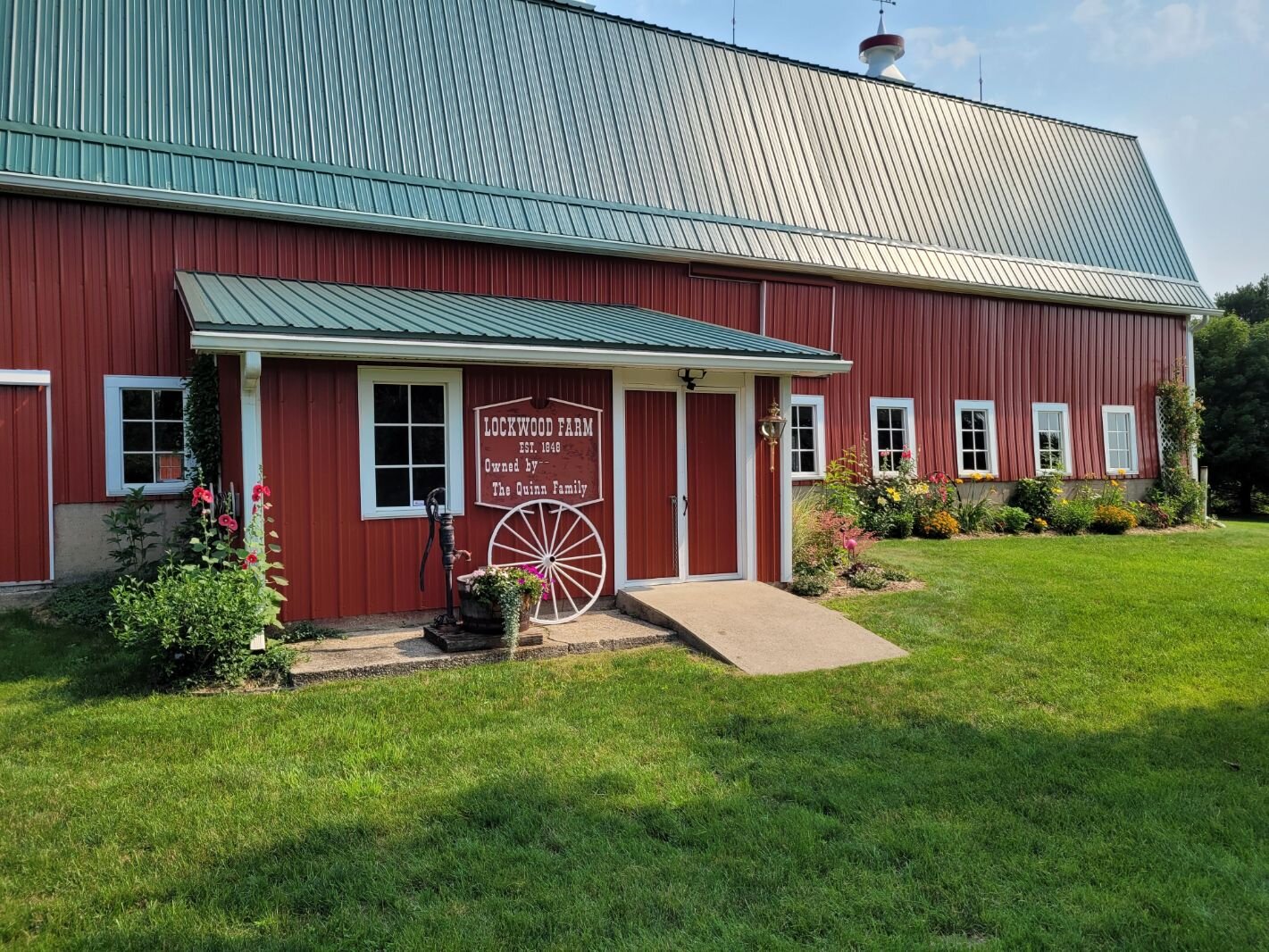 Ron Quinn and his wife Ann purchased 26 acres of the 150-acre Lockwood farms property in 1987. It included a house and a barn which was in really bad condition and have brought it back to life.A new basement and backfill for the granary were donated and Quinn now is raising money through grants and donations to cover an estimated $168,000 that has been budgeted to make exterior repairs including a new roof, siding, and restoration of the cupola. Interior work will involve the creation and installation of displays about the history of Lockwood Farms.
Ron Quinn and his wife Ann purchased 26 acres of the 150-acre Lockwood farms property in 1987. It included a house and a barn which was in really bad condition and have brought it back to life.A new basement and backfill for the granary were donated and Quinn now is raising money through grants and donations to cover an estimated $168,000 that has been budgeted to make exterior repairs including a new roof, siding, and restoration of the cupola. Interior work will involve the creation and installation of displays about the history of Lockwood Farms.The granary should belong to the community, Quinn says.
"We hope to get it all back together so that we have a way to show people how things used to be done on a farm," he says. "If we don't save these barns and structures we're losing out on our agricultural history. The owners can't keep them up and pay taxes on them. Some of us have to save agricultural history in any way that we can."
In addition to his work with the Granary restoration, Quinn and his wife purchased 26 acres of the 150-acre Lockwood farms property in 1987. It included a house and a barn which was in "really bad condition," he says. "With the amount of money needed to restore the house and barn, we felt that we couldn't buy it all."
When the Quinns took ownership, the barn was leaning severely west and had no windows. After some searching, they found a barn contractor in Hesperia who straightened the barn. Not long after this, Quinn and Arnett became aware of each other and their mutual interest in saving barns. Arnett wrote an article in 2018 about the Quinns' restoration efforts for Michigan Farmer magazine.
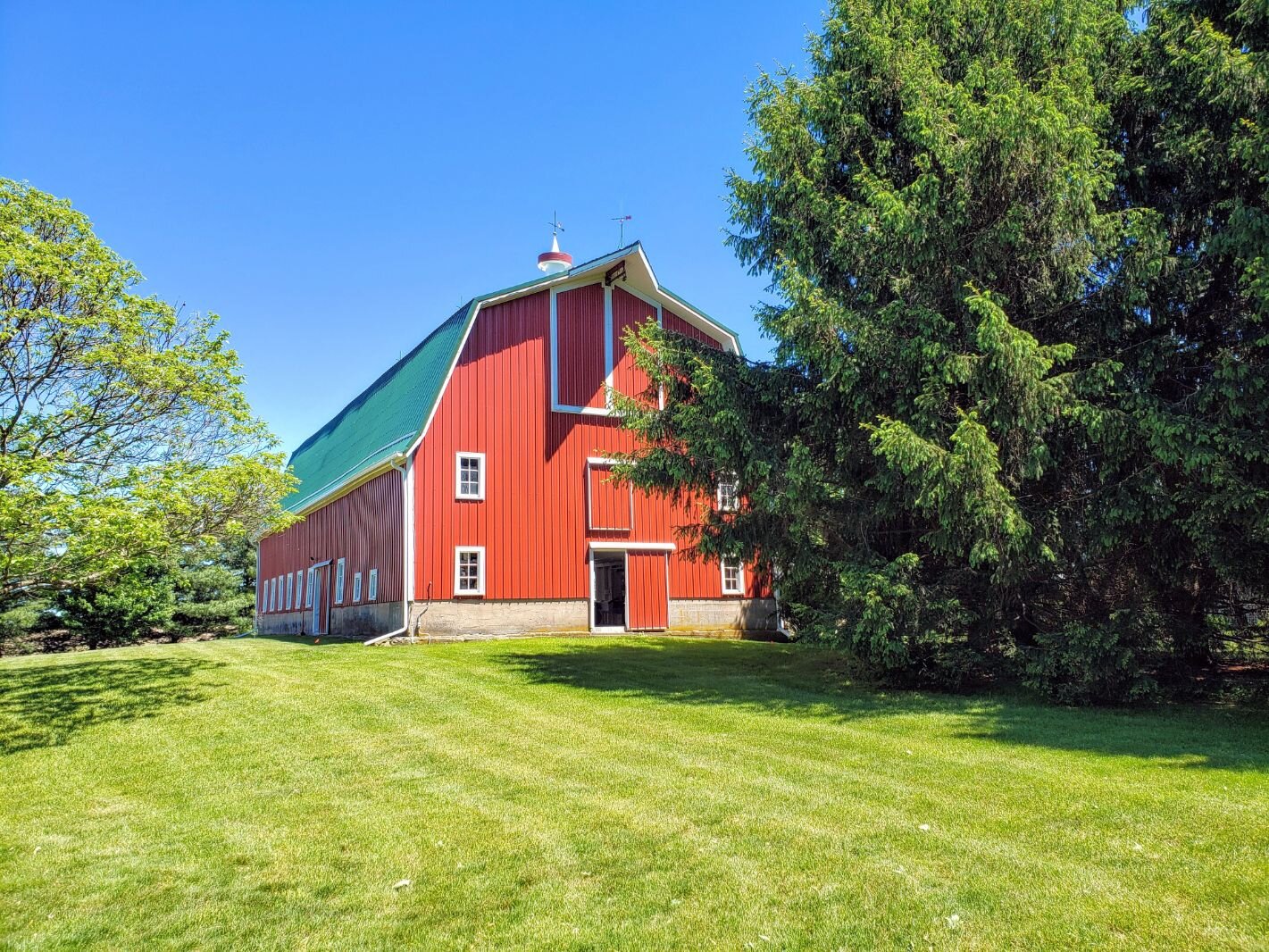 The barn had to be straightened and cabled so it would not move as it had in the past.This past summer the Quinns completed restoration of the 38 feet by 86 feet barn. Ron and Ann were both raised on farms and have always been interested in going back to their roots.
The barn had to be straightened and cabled so it would not move as it had in the past.This past summer the Quinns completed restoration of the 38 feet by 86 feet barn. Ron and Ann were both raised on farms and have always been interested in going back to their roots.
"That's why my wife and I bought and restored the house and barn. It's something we've always been interested in," he says. "We wanted some space because we had that farm background and land around us as we were growing up."
Preservation and Reality
Arnett says people who purchase and restore barns typically grew up on a farm or in rural communities where barns were a fixture in the agricultural landscape.
She grew up on a farm in Menominee County in the Upper Peninsula. That farm was sold in 1969. For several years after leaving the farm she made trips back home and witnessed the gradual deterioration of the barn that was built in 1910 by her grandfather.
"In the late 1960s farming was really changing. Herds of animals were being sold and farms were being consolidated," says Arnett, who moved from her hometown in 1971 to attend Albion College. "When I would go home back to the U.P. I would drive through neighborhoods and bit by bit barns were coming down or just being left to fall down on their own. At that point, I began documenting in photos what was going on and trying to be part of a process to get the word out and trying to save these barns. Some people didn't get it and they would say 'It's just an old barn and it has no use.' But momentum is building for giving old barns new uses."
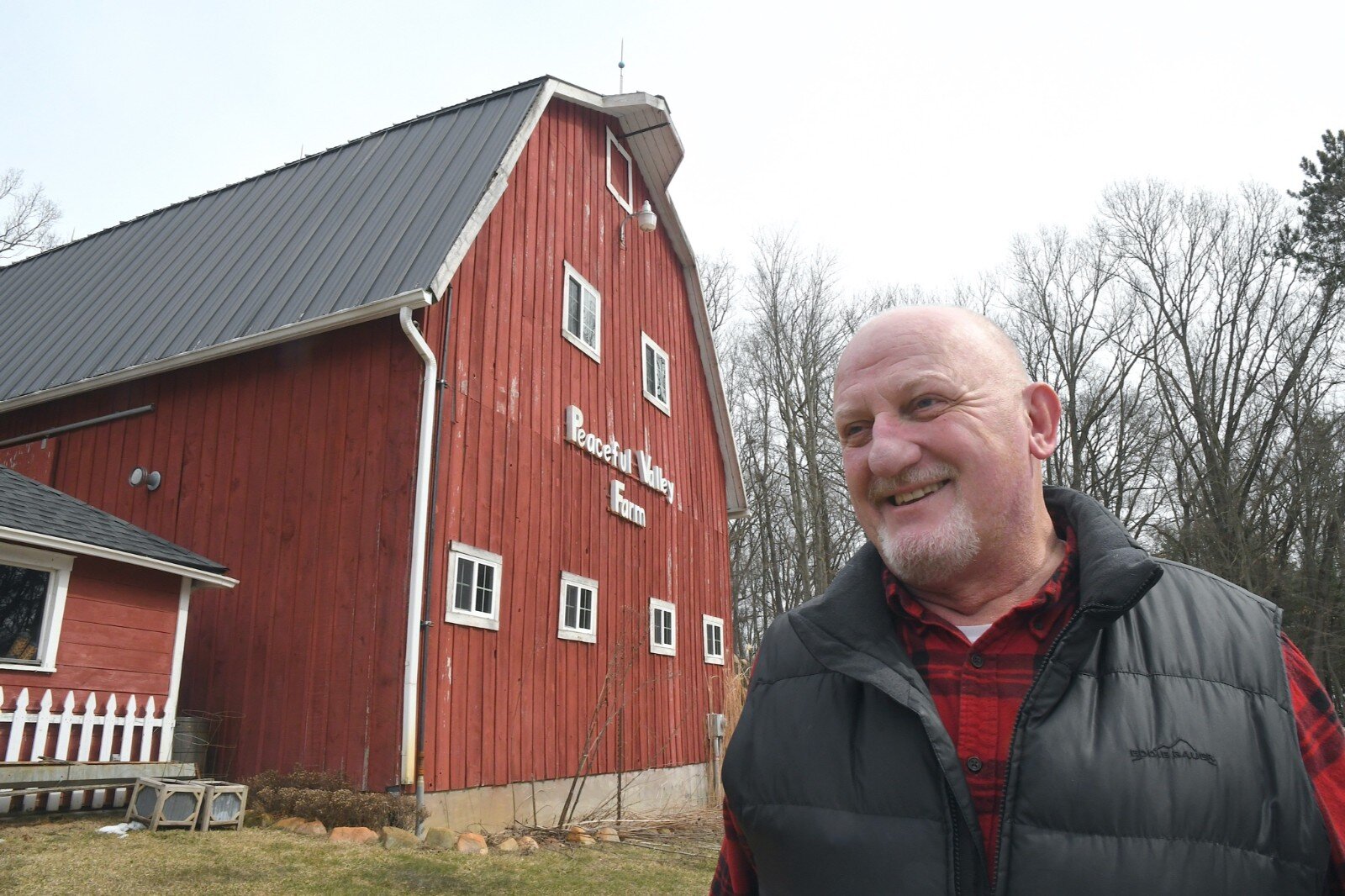 In recent years, barns have become the venue of choice for events including weddings, graduations, and proms. The Knot, an online wedding planning site, devoted an article solely to rustic barn wedding ideas.
In recent years, barns have become the venue of choice for events including weddings, graduations, and proms. The Knot, an online wedding planning site, devoted an article solely to rustic barn wedding ideas.
A restored barn at Peaceful Valley Farm located on Peaceful Valley Road in Battle Creek has been the site of weddings, corporate gatherings, graduation parties, and proms, says former owner A.J. Jones who began making the space available to the public in 2012.
Jones, the retired CEO of Grace Health and founder of the Family Health Center, grew up in Augusta and was very familiar with barns and farmyards. When Arnett told him that the 187-year-old Weeks Dairy barn in the Level Park area was up for grabs, he did his research and purchased it for $1 from the owner who was going to burn it down.
"It was not in the worst shape, but it was not in the best shape. The roof was caving in and water was going in and it would have eventually rotted and fallen apart," he says. "We covered it with tarps to let it dry out in the fall of 2009 and moved it in 2010 onto our property. It was a huge undertaking. It took about three months."
A now-defunct barn moving service in Rockford took the barn down piece by piece at its original location, moved it five miles down the road to Jones' property, and put it back together. Jones declined to say how much it cost he and his wife, Kay, to refurbish the 1,400-square-foot barn and make it usable again.
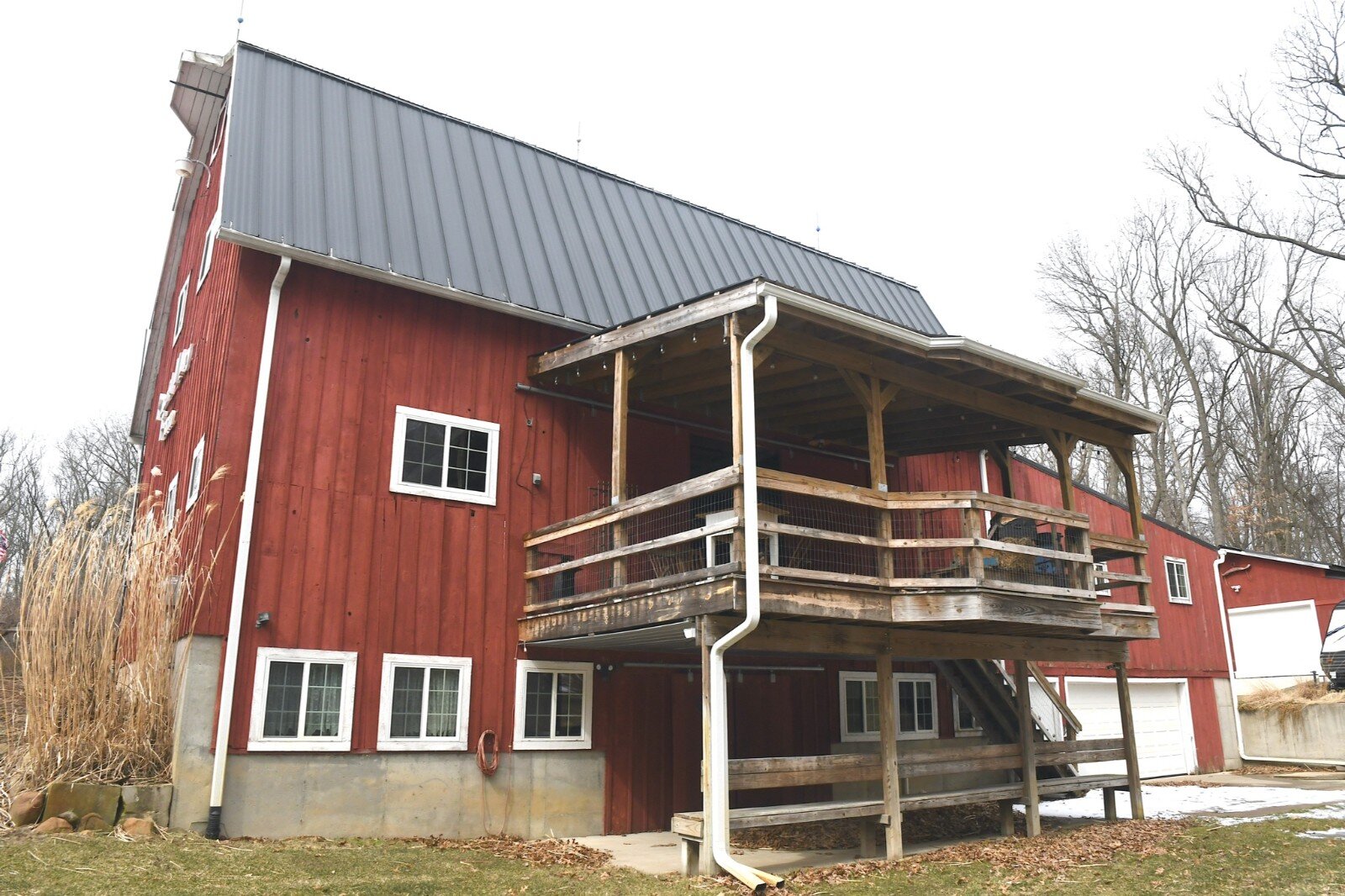 A view of the exterior of the barn that A. J. Jones moved several years ago.After the barn had been moved, he says members of the Weeks family stopped by to share stories with him about playing in the barn and the hayloft.
A view of the exterior of the barn that A. J. Jones moved several years ago.After the barn had been moved, he says members of the Weeks family stopped by to share stories with him about playing in the barn and the hayloft.
"I just love the look of barns. I hate getting rid of historic things. I'm a barn hugger," Jones says. "With this barn, I thought 'don't burn it down because we can salvage some of this.' I originally was just going to move the barn to our property and have it available for family events, but once it was put up, people said it would be a great wedding venue and in 2012 we made it a wedding venue."
Jones says, "It's a little bit more casual and isn't like the church. It fits their (the couple's) personality, it's rustic and timeless and photos taken in the barn are just very beautiful. It lends itself to more of an informal gathering place and changes the ways a wedding is going to be done."
In addition to weddings, the barn was the site of a Pennfield High School prom and also was used for corporate events by the Kellogg Co. and graduation parties.
Through his work to save the barn, Jones met Corey Arnett, and together they started Barn Believers.
"Barns are part of the culture of our community and the country," says Jones who had been with Barn Believers until health issues forced him to step aside. "They're iconic to our country."
In October he and his wife sold the barn and their property and downsized to a ranch-style home in Galesburg. Jones says the barn requires a lot of upkeep and he and his wife no longer wanted to deal with the wedding and event requests.
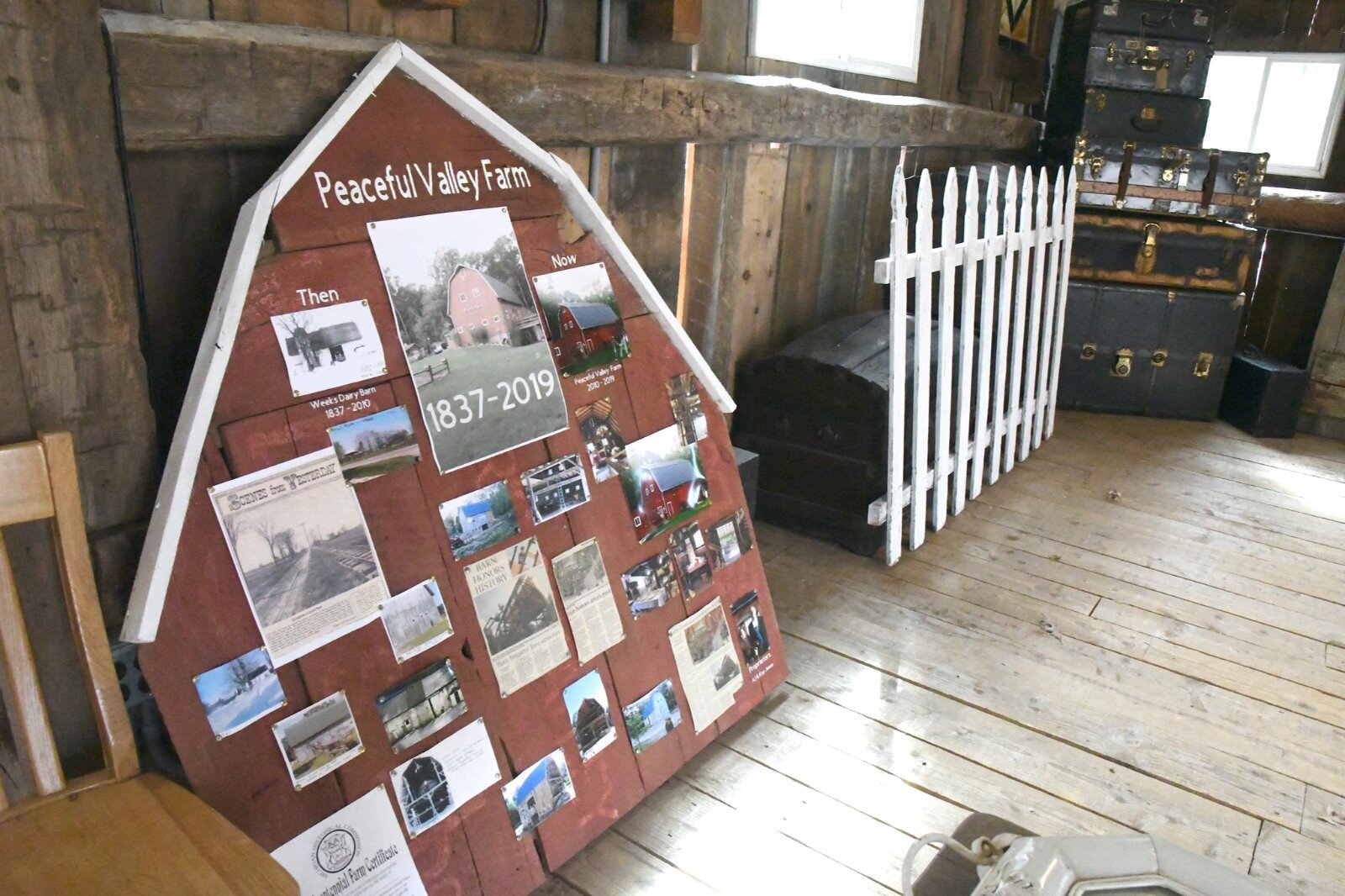 History of the Peace Valley Farm are on display inside the barn.Quinn says two women recently stopped at his property to ask if one of their daughters could get married in their barn.
History of the Peace Valley Farm are on display inside the barn.Quinn says two women recently stopped at his property to ask if one of their daughters could get married in their barn.
"We're not zoned for it. You need a special use permit for it to be used as a wedding barn or a Bed & Breakfast," he says. "When we're not around anymore the barn could be something that someone else could have multiple uses for."
Arnett says she saw the momentum to save barns starting to build about 12 years ago along with new ways to use barns.
"I began seeing barns getting more uses and more stories about saving them," she says. "Bit by bit we're seeing new uses for old barns and now with the resurgence of small family farms, the growth of organic and specialized crops, and different ways of raising livestock, I think the resurgence and interest in saving existing barns will only continue."
Comments
Post a Comment